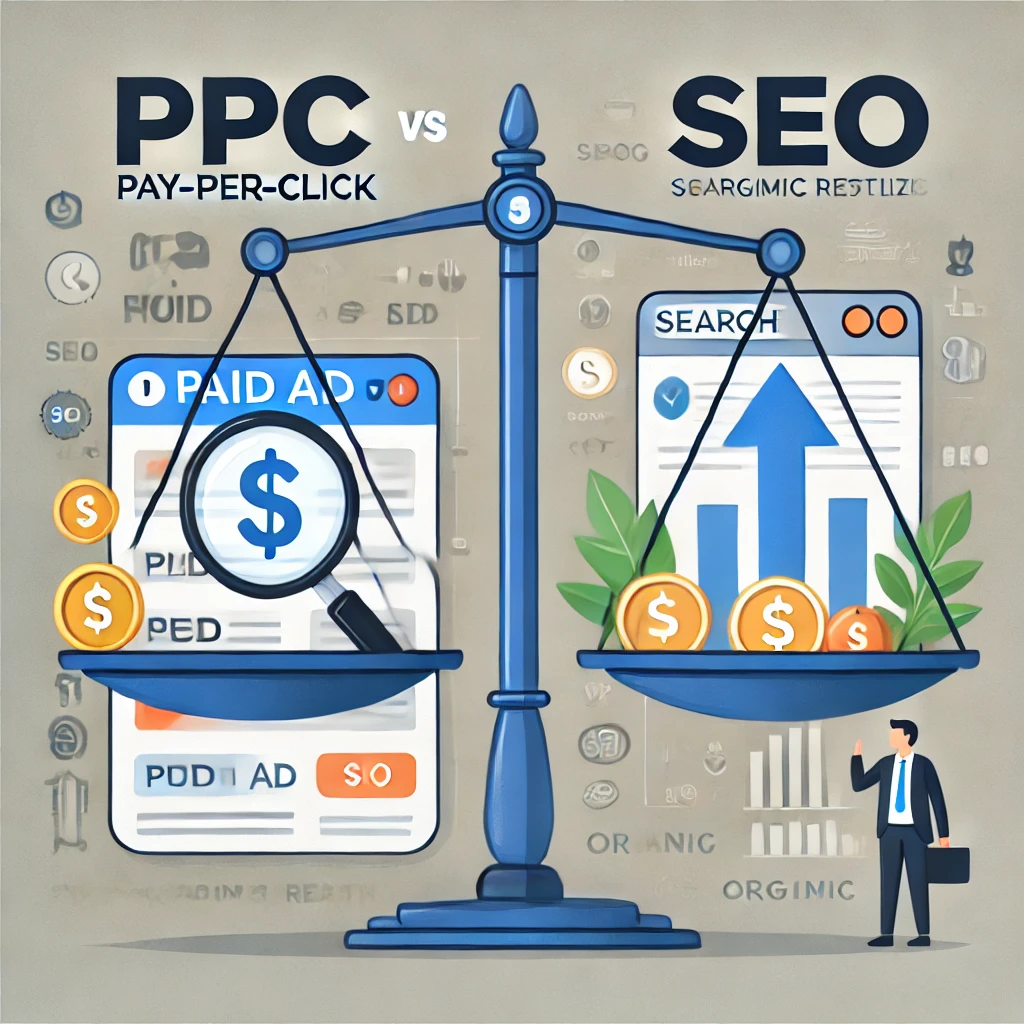In the world of digital marketing, businesses face a critical question: PPC or SEO, which strategy works best? While both methods aim to drive traffic and conversions, they differ greatly in their approach, benefits, and costs. Understanding the key differences between Pay-Per-Click (PPC) and Search Engine Optimization (SEO) can help you make an informed decision that aligns with your business goals.
What is PPC?
Pay-Per-Click (PPC) is an online advertising model where advertisers pay each time a user clicks on their ad. These ads typically appear at the top of search engine results pages (SERPs), above the organic listings. Google Ads and Bing Ads are two of the most popular platforms for PPC.
Key Features of PPC:
- Immediate Results: PPC offers instant visibility, meaning your ad can appear on the first page of search results right after your campaign is launched.
- Cost Control: You can set your budget and only pay when someone clicks on your ad.
- Targeted Audience: PPC allows you to target specific demographics, locations, and even times of the day.
- Measurable ROI: With detailed tracking, you can measure your return on investment (ROI) down to each click and conversion.
- Temporary Impact: Once you stop paying for PPC, your ads disappear from the SERPs.
What is SEO?
Search Engine Optimization (SEO) refers to the practice of optimizing your website to rank higher in the organic search results. SEO focuses on improving the quality and relevance of your content and ensuring that your website is technically sound.
Key Features of SEO:
- Long-Term Results: Unlike PPC, SEO is a long-term strategy that takes time to show results but can sustain rankings without continuous payments.
- Organic Traffic: SEO helps your site rank naturally on search engines, leading to “free” clicks.
- Credibility and Trust: Users tend to trust organic results more than paid ads, so ranking high through SEO can boost your credibility.
- Ongoing Effort: SEO requires continuous effort, including content creation, keyword optimization, and technical upkeep.
- Algorithm Changes: Search engine algorithms frequently change, so SEO strategies must adapt to maintain or improve rankings.
PPC vs. SEO: A Detailed Comparison
| Factor | PPC | SEO |
|---|---|---|
| Cost | You pay for each click, can be expensive. | Requires time and resources but no direct cost for clicks. |
| Time to Results | Instant visibility once ads are live. | Slow, often taking months to show significant impact. |
| Long-Term Value | No lasting value once ads are turned off. | Long-term, with sustainable traffic and rankings. |
| Control | High control over targeting and ad placement. | Limited control over SERP rankings, depends on algorithm changes. |
| Click-Through Rate (CTR) | Usually lower than organic listings. | Typically higher, as organic results are trusted more. |
| Competitiveness | More expensive and competitive for high-value keywords. | Can be equally competitive but cost-effective in the long run. |
When to Use PPC
PPC is ideal for businesses that need immediate results, such as during a product launch or seasonal sales. It’s also useful if you have a specific target audience and are willing to invest in ads to drive instant traffic.
You should consider PPC if:
- You need fast visibility and quick traffic.
- You have a short-term campaign or limited-time offer.
- You want to target specific demographics, locations, or devices.
- You have a budget to invest in paid advertising.
When to Use SEO
SEO is a long-term strategy that works best for businesses looking to build sustainable online presence. It’s suitable if you’re aiming to attract organic traffic and build brand authority over time.
You should focus on SEO if:
- You want to build long-term credibility and trust with users.
- You are in it for the long haul and don’t need immediate results.
- You have the resources to invest in content creation and technical optimization.
- Your budget doesn’t allow for consistent paid advertising.
Combining PPC and SEO: A Holistic Approach
In reality, many successful businesses use both PPC and SEO to maximize their visibility and reach. PPC can drive immediate traffic while SEO builds long-term organic rankings. This combined approach ensures that your business covers both short-term and long-term digital marketing goals.
For example:
- PPC can be used to test which keywords convert well, then you can focus your SEO efforts on those keywords.
- You can use retargeting ads through PPC to bring back visitors who originally found you via organic search.
Conclusion: Which Strategy is Best for Your Business?
Choosing between PPC and SEO depends on your business goals, budget, and timeline. If you need quick traffic and have the budget for paid campaigns, PPC is a great option. If you’re looking for long-term growth and want to establish authority in your industry, SEO should be your focus. However, the most powerful approach often lies in a combination of both strategies, allowing you to capitalize on the strengths of each.
Before committing to one or both strategies, evaluate your goals, resources, and what you’re aiming to achieve. This way, you can ensure that your digital marketing efforts align with your business’s unique needs.

